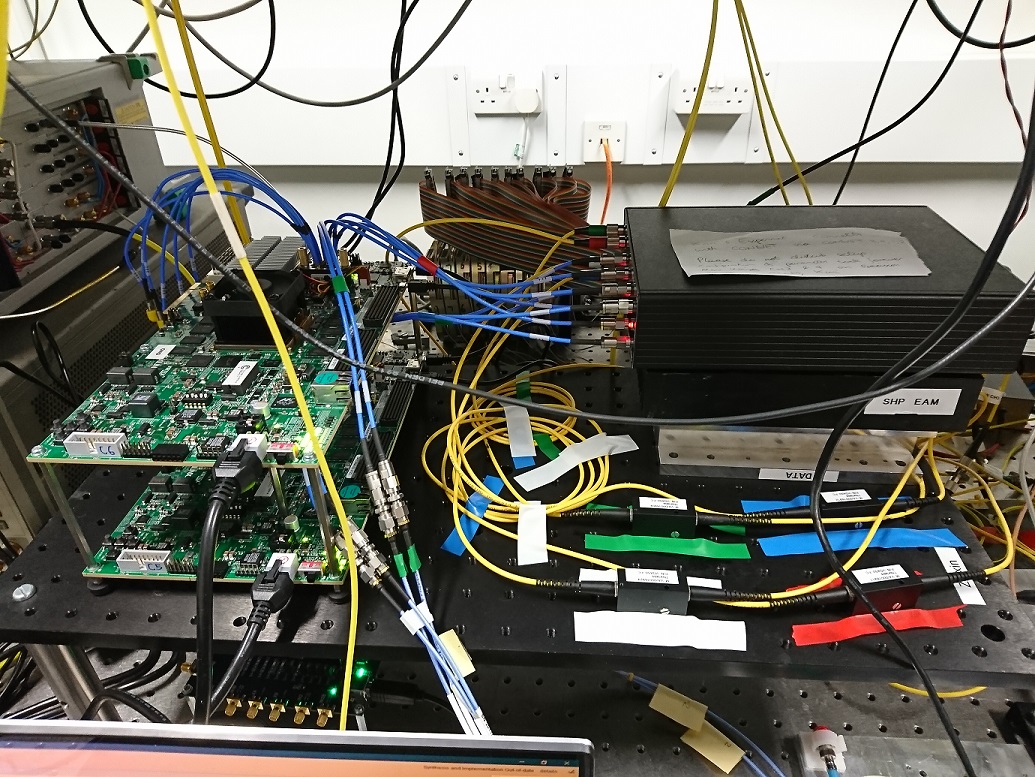The highs and lows of PhD life with Kari Clark
Kari Clark is a final year PhD student from the Optical Networks Group at UCL. In this Q+A, Kari describes a tough second year before going on to develop an innovative (and award winning!) technique for clock and data recovery of optically switched data centres.
This post is part of a series focusing on the achievements of our student researchers throughout 2020.
What’s been the most challenging part of your PhD and why? And the most rewarding?
The second year of my PhD was extremely challenging. During that year, my original primary and secondary supervisors both left UCL, my father was ill, my grandmother died, I had very little in the way of results, I had no publications and there was uncertainty regarding the funding of the remainder of my PhD. I was advised, and rightly so, to consider not continuing with my studies. I knew that I would regret that however, and so I choose to continue, in the hope that things would improve. They did.
The most rewarding part of my PhD project was managing to get past these difficulties and go on to achieve so much in the later years of my PhD project. I am very thankful to the many people who were instrumental in helping me to do so, but particularly my supervisor Zhixin, Polina, Hitesh and Paolo from Microsoft Research, Radan from the University of Southampton, and my family.
 Do you have particular highlight?
Do you have particular highlight?
Winning the EPSRC Connected Nation Pioneers award, having my phase caching post-deadline conference paper and its follow-up journal paper accepted by Nature Electronics were all rather significant highlights.
However, the most significant highlight for me, which came before these, was seeing my clock phase caching technique working for the first time, late in the evening in our optical communications laboratory (photo, right). I had been writing and testing field programmable gate array (FPGA) hardware code to implement the technique for about two months, and it was very satisfying to finally see my idea work. It was a key turning point in my PhD project: from being unsuccessful, to successful.
How did the pandemic impact your write-up and hand-in?
Writing a thesis is a very mentally intensive task. It has been rather difficult to escape from the news this year, consequently, finding concentration for writing has also been difficult at times, which lengthened the writing process. On the other hand, I was fortunate to not need to gather any results in the laboratory this year, and I enjoyed spending some additional time exploring more theoretical aspects of my work, which strengthened my thesis.
The hand-in process during the pandemic was very easy: submitting my thesis was a simple process of uploading a PDF file to Dropbox. I was glad to not need to print and bind the thesis!
What’s your advice for new students joining the team?
Do work hard at your PhD, but make sure that you look after your mental and physical health too. A good way to help ensure that is to pursue activities and hobbies outside of your PhD. Get involved in a UCL Student Society, learn a new language, play sports – whatever interests you most. In my case, I really enjoyed playing board games in, and being a committee member of, the UCL Science Fiction and Fantasy Society. Additionally, if you run into difficulties during the PhD, ask for help, since there are plenty of people in the team that would be able to provide it.
What’s next for you?
I intend to continue with my research. A key aspect of my work this year has been developing an analytical model of clock phase caching, which formed a significant proportion of my PhD thesis. As a starting point for my research post-PhD, I would like to develop this further, with the aim of publishing a journal paper or two on the topic. I am also very interested in the potential application of clock phase caching to access networks to improve their performance. Access networks are a particularly important optical communications research area in the wake of the COVID-19 pandemic, where global productivity has relied heavily on the quality of home broadband internet connections.
Kari joined the Optical Networks Group at UCL in 2014. His PhD research was jointly funded by Inphi Corporation, Microsoft Research UK, the EPSRC AirGuide Photonics Programme Grant (EP/P030181/1) and the EPSRC PhotoDAC Grant (EP/R041792/1). His thesis title is ‘Clock Synchronisation Assisted Clock and Data Recovery for Sub-Nanosecond Data Centre Optical Switching’ under the supervision of TRANSNET Co-I Dr Zhixin Liu. Kari has been a member of the TRANSNET Programme since 2018.